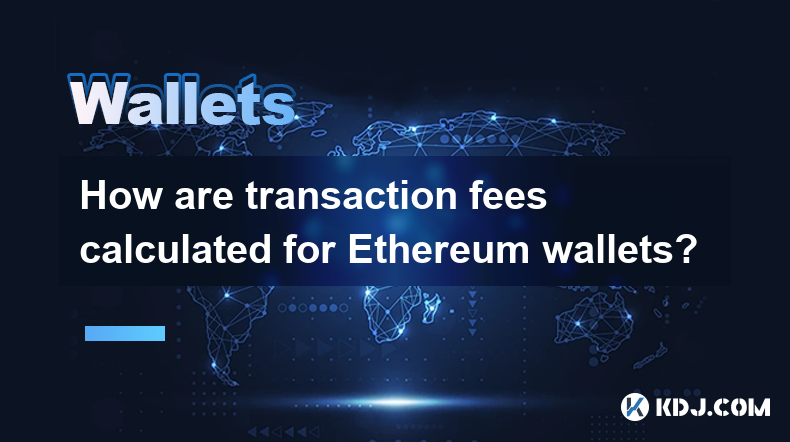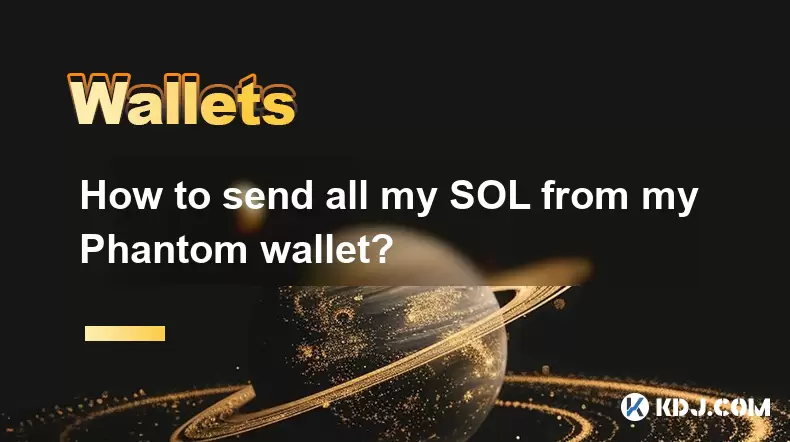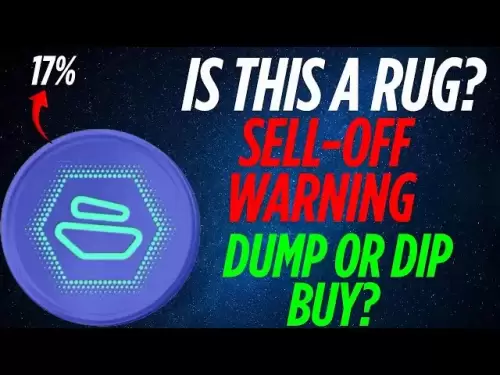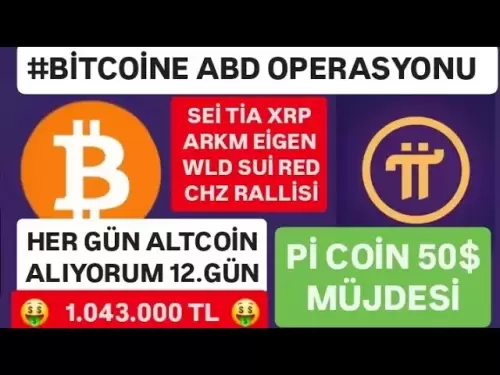-
 Bitcoin
Bitcoin $107,810.8710
-1.45% -
 Ethereum
Ethereum $2,531.4386
-1.75% -
 Tether USDt
Tether USDt $1.0000
-0.03% -
 XRP
XRP $2.2542
-0.99% -
 BNB
BNB $659.1350
-0.50% -
 Solana
Solana $148.5456
-2.40% -
 USDC
USDC $0.9999
-0.02% -
 TRON
TRON $0.2868
-0.44% -
 Dogecoin
Dogecoin $0.1666
-3.65% -
 Cardano
Cardano $0.5751
-2.36% -
 Hyperliquid
Hyperliquid $37.6845
-5.51% -
 Bitcoin Cash
Bitcoin Cash $494.9448
-0.65% -
 Sui
Sui $2.8396
-3.31% -
 Chainlink
Chainlink $13.2423
-2.59% -
 UNUS SED LEO
UNUS SED LEO $9.0482
0.02% -
 Stellar
Stellar $0.2467
-2.44% -
 Avalanche
Avalanche $17.8165
-3.63% -
 Shiba Inu
Shiba Inu $0.0...01158
-2.41% -
 Toncoin
Toncoin $2.7397
-3.42% -
 Hedera
Hedera $0.1560
-2.73% -
 Litecoin
Litecoin $85.8559
-2.34% -
 Monero
Monero $315.3710
-2.30% -
 Dai
Dai $1.0001
0.00% -
 Polkadot
Polkadot $3.3443
-2.03% -
 Ethena USDe
Ethena USDe $1.0001
0.01% -
 Bitget Token
Bitget Token $4.2888
-3.73% -
 Uniswap
Uniswap $7.3388
-1.57% -
 Aave
Aave $278.2986
-3.05% -
 Pepe
Pepe $0.0...09807
-3.67% -
 Pi
Pi $0.4563
-2.39%
How are transaction fees calculated for Ethereum wallets?
Ethereum transaction fees (gas fees) depend on gas limit (transaction complexity) and gas price (speed). Higher gas prices ensure faster processing but cost more; a balance is crucial to avoid delays or overspending.
Mar 24, 2025 at 04:28 am

How are Transaction Fees Calculated for Ethereum Wallets?
Ethereum transaction fees, often called "gas fees," are not fixed amounts. They dynamically adjust based on network congestion and the complexity of the transaction. Understanding how these fees are calculated is crucial for efficient and cost-effective use of the Ethereum network. Several factors contribute to the final cost you pay.
The primary component of an Ethereum transaction fee is the "gas limit." This represents the maximum amount of computational effort the transaction requires. More complex transactions, like those involving many smart contracts or large amounts of data, will naturally have higher gas limits. The gas limit is set by the sender, but the transaction will fail if it exceeds the available computational resources. It's important to estimate this accurately to avoid unnecessary costs or transaction failures.
The second crucial element is the "gas price." This is expressed in Gwei, which is a unit of Ether (ETH), specifically one billionth of an ETH. The gas price represents the amount you're willing to pay per unit of gas consumed. A higher gas price increases your chances of having your transaction processed quickly, as miners prioritize transactions with higher gas prices. However, excessively high gas prices are unnecessary unless you need immediate processing.
The total transaction fee is simply the product of the gas limit and the gas price. Therefore, Total Fee = Gas Limit * Gas Price. For example, if your transaction has a gas limit of 21,000 and you set a gas price of 20 Gwei, your total fee would be 420,000 Gwei, which needs to be converted to ETH to see the actual cost. Various tools and websites provide gas price estimations.
Several factors influence the gas price. Network congestion is a major factor. When many transactions are competing for processing, the gas price naturally rises. This is similar to rush hour traffic – you pay more to get where you need to go faster. The time of day and week also impacts gas prices, with peak hours typically resulting in higher fees. Observing gas price trends is essential for planning transactions.
Choosing the right gas price requires a balance. Setting it too low might result in your transaction being delayed or even failing to be processed. Setting it too high is simply wasteful. Many wallets offer gas fee estimation tools that analyze current network conditions and suggest appropriate gas prices. These tools usually provide options like "fast," "average," and "slow," each with a different gas price suggestion.
Furthermore, different Ethereum wallets may offer different approaches to gas fee estimation and display. Some may present the gas fee in Gwei directly, while others may convert it to ETH upfront. Understanding your wallet's specific interface is essential for accurately interpreting the fees. Always double-check the total cost before confirming a transaction.
How to Estimate Gas Fees:
- Use your wallet's built-in gas fee estimator: Most modern Ethereum wallets provide tools to estimate gas fees based on current network conditions. These tools typically offer different speed options (fast, average, slow) with corresponding gas price suggestions.
- Consult external gas fee tracking websites: Numerous websites and tools track real-time gas prices on the Ethereum network. These resources provide valuable insights into current network congestion and help you make informed decisions about your gas price.
- Understand the transaction complexity: More complex transactions, such as those involving many smart contracts or large amounts of data, will require a higher gas limit, leading to higher fees. Try to optimize your transactions to reduce complexity where possible.
- Monitor network congestion: Pay attention to the overall activity on the Ethereum network. Times of high network congestion typically correlate with higher gas prices. Consider scheduling transactions during periods of lower activity if possible.
Frequently Asked Questions:
Q: What happens if I set the gas price too low?
A: If your gas price is too low, your transaction might not be included in a block for a long time, or it may fail to be processed entirely. Miners will prioritize transactions offering higher fees.
Q: What happens if I set the gas price too high?
A: Setting the gas price too high simply means you are paying more than necessary for the transaction. You will still get your transaction processed, but you will have spent extra ETH.
Q: Can I change the gas price after initiating a transaction?
A: No, once you've initiated a transaction with a specific gas price, you cannot change it. It's crucial to carefully review and confirm the fees before sending the transaction.
Q: How often do gas prices fluctuate?
A: Gas prices are constantly fluctuating based on network congestion and demand. They can change significantly within minutes or hours. Always check the current gas price before initiating a transaction.
Q: Are gas fees the same for all Ethereum wallets?
A: While the underlying mechanism for calculating gas fees is the same across all Ethereum wallets, the user interface and estimation tools might vary. Each wallet may present the information differently.
Q: Are there ways to reduce gas fees?
A: You can reduce gas fees by choosing a lower gas price (accepting slower processing times), simplifying the transaction, or waiting for periods of lower network congestion. Batching multiple transactions into one can also be helpful.
Q: What is Gwei?
A: Gwei is a unit of Ether (ETH). 1 Gwei is one billionth of an ETH (10⁻⁹ ETH). Gas prices are typically expressed in Gwei.
Q: What if my transaction fails due to insufficient gas?
A: If your transaction fails due to insufficient gas, the ETH you paid as a gas fee is lost. You'll need to retry the transaction with a higher gas limit.
This information is for educational purposes only and should not be considered financial advice. Always conduct your own research and understand the risks involved before engaging with cryptocurrencies.
Disclaimer:info@kdj.com
The information provided is not trading advice. kdj.com does not assume any responsibility for any investments made based on the information provided in this article. Cryptocurrencies are highly volatile and it is highly recommended that you invest with caution after thorough research!
If you believe that the content used on this website infringes your copyright, please contact us immediately (info@kdj.com) and we will delete it promptly.
- Ethereum, Exchanges, and Price Resilience: Navigating the Crypto Landscape
- 2025-07-08 08:30:13
- Bitcoin's NVT Golden Cross: Is a Local Top Brewing?
- 2025-07-08 09:10:11
- Semler Scientific's Bitcoin Bonanza: A Cryptocurrency Goal?
- 2025-07-08 09:10:11
- From Coin Flips to Cityscapes: How Names, Parks, and Planting Shaped St. Albert
- 2025-07-08 08:50:12
- Candles, Laundromats, and Inspiration: A Surprising New York Story
- 2025-07-08 09:15:11
- Iron Maiden Rocks the Royal Mint: A 50th Anniversary Coin That Kicks Ass
- 2025-07-08 09:15:11
Related knowledge

How to cancel a pending transaction in Phantom wallet?
Jul 03,2025 at 07:21pm
Understanding Pending Transactions in Phantom WalletA pending transaction in the Phantom wallet occurs when a user initiates a transfer or interaction with the Solana blockchain, but it hasn't yet been confirmed by the network. This can happen due to various reasons such as low transaction fees, network congestion, or incorrect gas settings. It's import...

How to see the estimated value of my tokens in Phantom wallet?
Jul 04,2025 at 12:21am
What is Phantom Wallet?Phantom wallet is one of the most popular cryptocurrency wallets designed for the Solana blockchain. It allows users to store, send, receive, and manage various tokens built on Solana, including SPL tokens and NFTs. The wallet offers a user-friendly interface, making it accessible for both beginners and advanced users in the crypt...

How to lock my Phantom wallet extension?
Jul 03,2025 at 11:14am
What Is the Phantom Wallet and Why Lock It?The Phantom wallet is a popular non-custodial cryptocurrency wallet designed for interacting with the Solana blockchain. Supporting both browser extensions and mobile apps, Phantom allows users to store, send, receive, and stake SOL tokens, as well as interact with decentralized applications (dApps). Securing y...

Does Phantom wallet offer two-factor authentication (2FA)?
Jul 03,2025 at 09:00am
Understanding Phantom Wallet and Its Security FeaturesPhantom wallet is a widely used non-custodial cryptocurrency wallet that supports the Solana blockchain. It allows users to store, send, receive, and interact with decentralized applications (dApps) seamlessly. As security is a top priority for any crypto wallet user, security features like two-facto...

How to send all my SOL from my Phantom wallet?
Jul 06,2025 at 10:00am
Preparing to Send SOL from Your Phantom WalletBefore initiating any transaction, it is crucial to ensure that your Phantom wallet is fully set up and connected to the correct network. Phantom supports multiple networks, but for sending SOL, you must be on the Solana blockchain. Confirm this by checking the network indicator in the top-right corner of th...

What is "rent" on Solana and how does it affect my Phantom wallet?
Jul 02,2025 at 08:35pm
Understanding 'Rent' on SolanaIn the context of Solana, the term 'rent' refers to a storage fee that users pay for maintaining data on the blockchain. Unlike Ethereum, where storage costs are paid once via gas fees during contract deployment, Solana implements a recurring cost model to ensure efficient usage of network resources. This means that any acc...

How to cancel a pending transaction in Phantom wallet?
Jul 03,2025 at 07:21pm
Understanding Pending Transactions in Phantom WalletA pending transaction in the Phantom wallet occurs when a user initiates a transfer or interaction with the Solana blockchain, but it hasn't yet been confirmed by the network. This can happen due to various reasons such as low transaction fees, network congestion, or incorrect gas settings. It's import...

How to see the estimated value of my tokens in Phantom wallet?
Jul 04,2025 at 12:21am
What is Phantom Wallet?Phantom wallet is one of the most popular cryptocurrency wallets designed for the Solana blockchain. It allows users to store, send, receive, and manage various tokens built on Solana, including SPL tokens and NFTs. The wallet offers a user-friendly interface, making it accessible for both beginners and advanced users in the crypt...

How to lock my Phantom wallet extension?
Jul 03,2025 at 11:14am
What Is the Phantom Wallet and Why Lock It?The Phantom wallet is a popular non-custodial cryptocurrency wallet designed for interacting with the Solana blockchain. Supporting both browser extensions and mobile apps, Phantom allows users to store, send, receive, and stake SOL tokens, as well as interact with decentralized applications (dApps). Securing y...

Does Phantom wallet offer two-factor authentication (2FA)?
Jul 03,2025 at 09:00am
Understanding Phantom Wallet and Its Security FeaturesPhantom wallet is a widely used non-custodial cryptocurrency wallet that supports the Solana blockchain. It allows users to store, send, receive, and interact with decentralized applications (dApps) seamlessly. As security is a top priority for any crypto wallet user, security features like two-facto...

How to send all my SOL from my Phantom wallet?
Jul 06,2025 at 10:00am
Preparing to Send SOL from Your Phantom WalletBefore initiating any transaction, it is crucial to ensure that your Phantom wallet is fully set up and connected to the correct network. Phantom supports multiple networks, but for sending SOL, you must be on the Solana blockchain. Confirm this by checking the network indicator in the top-right corner of th...

What is "rent" on Solana and how does it affect my Phantom wallet?
Jul 02,2025 at 08:35pm
Understanding 'Rent' on SolanaIn the context of Solana, the term 'rent' refers to a storage fee that users pay for maintaining data on the blockchain. Unlike Ethereum, where storage costs are paid once via gas fees during contract deployment, Solana implements a recurring cost model to ensure efficient usage of network resources. This means that any acc...
See all articles

























































































